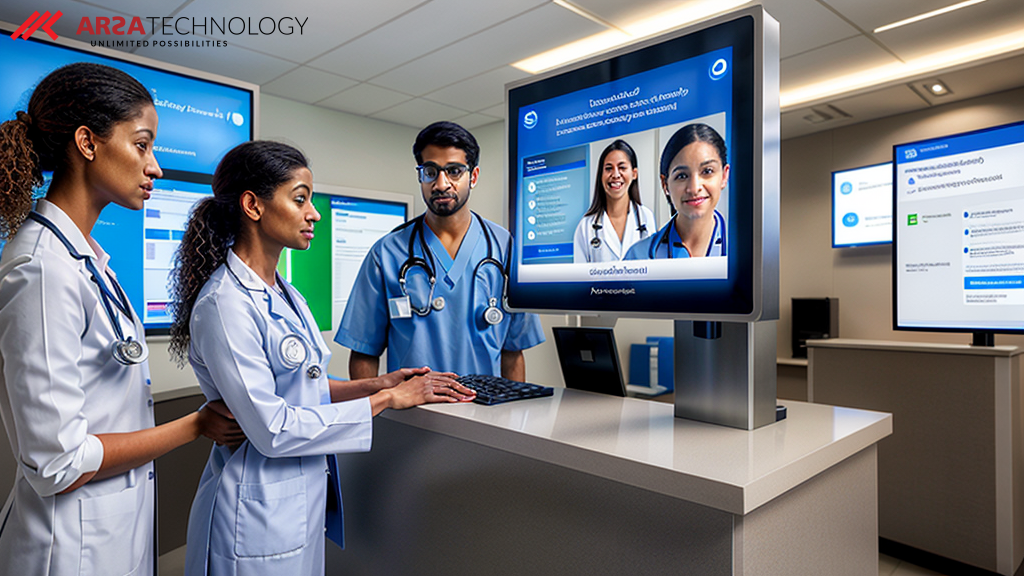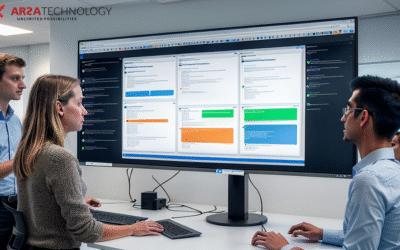Introduction: Overcoming Manual and Inefficient Workflows in Healthcare
The healthcare industry stands at a critical juncture, balancing the imperative for secure patient identity verification with the demand for streamlined, efficient operations. Manual identity checks, often involving physical documents and administrative overhead, are not only prone to human error but also contribute significantly to inefficient workflows, delaying patient care and increasing operational costs. This challenge is particularly acute in an era where patient data security and rapid service delivery are paramount.
ARSA Technology’s Face Recognition API offers a powerful solution, transforming how healthcare providers manage patient identity. By automating and securing this crucial process, organizations can move beyond outdated methods, enhancing both security and efficiency. However, like any advanced technology, successful deployment and ongoing optimization require a clear understanding of its capabilities and potential integration nuances. This article serves as a comprehensive guide for developers, solutions architects, and product managers in healthcare, addressing common challenges and offering strategic optimization tips to ensure your Face Recognition API implementation delivers maximum business value.
The Business Imperative: Streamlining Identity Verification in Healthcare
In healthcare, the stakes for accurate identity verification are exceptionally high. Misidentification can lead to severe consequences, from incorrect treatments and medication errors to fraudulent claims and breaches of patient privacy. Traditional methods, such as presenting ID cards or verbal confirmation, are often slow, create bottlenecks, and lack the robust security required in today’s digital landscape. These manual processes contribute directly to the core pain point of inefficient workflows, impacting everything from patient registration to accessing medical records.
ARSA Technology’s Face Recognition API provides a transformative approach to secure identity verification solutions. By enabling rapid, accurate, and touchless identification, it significantly reduces administrative burden, minimizes human error, and fortifies security protocols. Imagine patients checking in seamlessly, or medical staff instantly verifying identities before accessing sensitive information – this is the operational efficiency and enhanced security that biometric solutions bring. The goal is not just technology adoption, but strategic implementation that yields tangible ROI through improved patient experience, reduced operational costs, and strengthened compliance.
Understanding Common Challenges with Face Recognition Deployment
While the benefits of face recognition are clear, successful deployment in a complex environment like healthcare requires foresight. Developers and architects often encounter challenges related to data quality, environmental conditions, and integration complexities. These issues, if not proactively addressed, can hinder the API’s performance, leading to delays, user frustration, and ultimately, undermining the business value. Recognizing these potential roadblocks early is the first step toward building a resilient and effective identity verification system.
Optimizing Image Quality for Reliable Verification
The performance of any face recognition system is fundamentally linked to the quality of the input images. In healthcare, where diverse patient demographics and varying environments are common, ensuring optimal image capture is crucial for consistent accuracy. Poor image quality can lead to increased false rejections (frustrating legitimate users) or, worse, false acceptances (compromising security).
To achieve reliable verification, focus on these best practices for image capture:
* Consistent Lighting: Ensure the face is evenly lit, avoiding harsh shadows or overexposure. Natural, diffused light is often ideal. In clinical settings, consider dedicated lighting for capture stations.
* Clear Focus and Resolution: Images must be sharp and sufficiently high-resolution to capture facial features accurately. Blurry or pixelated images significantly degrade performance.
* Frontal Pose and Neutral Expression: Encourage users to look directly at the camera with a neutral expression. Extreme angles or exaggerated expressions can distort facial geometry, making recognition more challenging.
* Minimizing Obstructions: Ensure no hands, hair, glasses (if possible), or other objects obstruct key facial features like eyes, nose, and mouth. While ARSA’s API is robust, minimizing obstructions improves accuracy and speed.
* Background Simplicity: A plain, uncluttered background helps the API focus on the face, reducing potential interference from complex patterns or objects.
By implementing these guidelines, healthcare organizations can significantly improve the accuracy and speed of their identity verification processes, leading to smoother patient experiences and more efficient workflows.
Addressing Environmental and User-Related Factors
Beyond static image quality, dynamic factors in real-world healthcare environments can influence face recognition performance. These include varying ambient light, diverse user demographics, and the presence of accessories like masks or glasses. A robust solution must account for these variables to maintain high accuracy and user satisfaction.
Consider these strategies:
* Adaptive Capture Environments: Design capture stations that can adapt to different lighting conditions. This might involve adjustable lighting or sensors that optimize camera settings.
* User Guidance and Interface Design: Provide clear, intuitive instructions to users during the capture process. A well-designed user interface can guide individuals to position themselves correctly, ensuring optimal input.
* Handling Accessories: While masks present a unique challenge, ARSA Technology’s API is designed to perform effectively even with partial facial obstructions. However, for maximum accuracy, encouraging users to temporarily remove masks (where clinically appropriate and safe) during a dedicated verification step can be beneficial.
* Integration with Liveness Detection: To counter presentation attacks (e.g., using a photo or video of a legitimate user), integrating face recognition with liveness detection is crucial. ARSA Technology offers a dedicated preventing fraud with liveness detection API. This combination ensures that the person being verified is a live, present individual, adding an essential layer of security against sophisticated fraud attempts.
By proactively addressing these environmental and user-related factors, healthcare providers can ensure their biometric identity verification system is both highly secure and user-friendly, further reducing the reliance on manual checks and enhancing operational efficiency.
Ensuring Robust API Integration and Error Handling
Integrating a powerful API like ARSA’s Face Recognition into existing healthcare systems requires careful planning and execution. While the API is designed for ease of use, common integration pitfalls can lead to performance issues, system downtime, and a poor user experience. Effective error handling is not just a technical detail; it’s a critical component of maintaining operational continuity and patient trust.
Key considerations for robust integration:
* Thorough Documentation Review: Before beginning integration, meticulously review ARSA Technology’s comprehensive API documentation. Understanding the expected input formats, response structures, and error codes is fundamental.
* Strategic Data Formatting: Ensure that data sent to the API (e.g., image files, user IDs) adheres precisely to the specified formats. Mismatched data types or incorrect parameters are frequent sources of errors.
* Network Stability and Latency: In healthcare, where real-time verification might be critical, network stability and low latency are paramount. Design your integration to handle potential network fluctuations and implement appropriate timeouts to prevent system freezes.
* Proactive Error Management: Implement robust error handling mechanisms within your application. This means anticipating common API responses, including various error codes, and designing your system to gracefully manage them. For instance, if an image is deemed unsuitable, the system should prompt the user for a re-capture rather than simply failing.
* Comprehensive Testing: Before full deployment, conduct extensive testing across various scenarios, including edge cases and high-load conditions. This helps identify and resolve potential issues before they impact live operations.
To see the API in action and understand its capabilities firsthand, try our interactive demo on RapidAPI. This playground allows developers to experiment with the API’s functionality and observe its responses in a controlled environment, aiding in the development of robust error handling strategies. By focusing on these integration best practices, healthcare organizations can maximize the reliability and performance of their Face Recognition API deployment, ensuring secure and efficient identity verification.
Scalability and Performance Considerations for Enterprise Healthcare
Healthcare systems operate at scale, serving thousands or even millions of patients. Any identity verification solution must therefore be capable of handling high transaction volumes without compromising speed or accuracy. Performance bottlenecks in a critical system like patient check-in can lead to significant operational delays and patient dissatisfaction, directly impacting the business’s bottom line.
ARSA Technology’s Face Recognition API is built with enterprise-grade scalability in mind. It leverages a robust infrastructure designed to process a high volume of requests efficiently, ensuring that your identity verification processes remain swift and reliable even during peak demand.
Key aspects of performance optimization include:
* Efficient Resource Utilization: The API is optimized to use computational resources effectively, minimizing processing times for each verification request.
* High Availability: ARSA’s infrastructure is engineered for high availability, meaning the API is consistently accessible and responsive, reducing the risk of downtime that could disrupt patient services.
* Monitoring and Analytics: While not directly part of the API interaction, integrating monitoring tools to track API usage and performance metrics (e.g., response times, success rates) is crucial. This allows healthcare IT teams to proactively identify and address potential issues, ensuring the system continues to meet operational demands.
By choosing an API designed for scalability and performance, healthcare organizations can confidently deploy face recognition solutions that not only streamline workflows but also support future growth and evolving patient needs, without sacrificing speed or security.
Leveraging ARSA Technology for Superior Identity Verification
ARSA Technology is committed to empowering businesses with cutting-edge AI solutions that solve real-world problems. Our Face Recognition API is a testament to this commitment, offering a powerful, accurate, and secure tool specifically tailored to meet the rigorous demands of the healthcare industry. By integrating our API, organizations can move beyond the inefficiencies of manual identity verification, embracing a future where security and speed go hand-in-hand.
The benefits extend beyond mere technical functionality:
* Enhanced Patient Experience: Faster, smoother check-ins and secure access to services improve patient satisfaction.
* Operational Cost Reduction: Automating identity verification frees up staff from administrative tasks, allowing them to focus on patient care.
* Strengthened Security and Compliance: Robust biometric verification significantly reduces fraud risks and helps meet stringent regulatory requirements for patient data protection.
* Future-Proofing: Investing in a scalable and reliable API positions healthcare organizations at the forefront of digital transformation.
Our comprehensive suite of AI APIs, including our Face Liveness Detection API, ensures that you have the tools to build truly secure and efficient solutions. Explore how ARSA Technology can transform your operations and elevate your patient care standards.
Conclusion: Your Next Step Towards a Solution
The journey to overcome manual and inefficient workflows in healthcare identity verification is a strategic one, requiring robust technology and thoughtful implementation. ARSA Technology’s Face Recognition API provides the foundational power to achieve this transformation, offering a path to enhanced security, unparalleled efficiency, and an improved patient experience. By understanding and proactively addressing common challenges, from optimizing image quality to ensuring seamless integration and scalability, healthcare organizations can unlock the full potential of this advanced biometric solution.
The time to modernize identity verification is now. By leveraging ARSA Technology’s expertise and powerful APIs, you can build a future where secure, efficient, and patient-centric operations are the standard, not the exception.
Ready to Solve Your Challenges with AI?
Discover how ARSA Technology can help you overcome your toughest business challenges. Get in touch with our team for a personalized demo and a free API trial.







